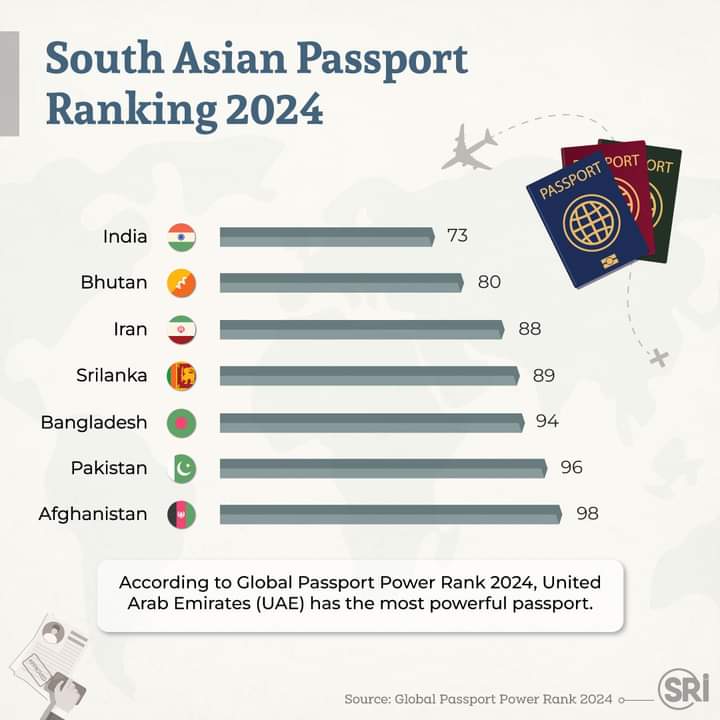
PAKISTANI PASSPORT ON DENIAL AS ALWAYS!
talha
- 0
In today’s increasingly interconnected world, passport strength is often seen as a measure of a country’s global reach, economic stability, and international credibility. For the fourth year in a row, Pakistan’s passport has been found at the bottom of the Henley Passport Index, ranking 199 countries based on the number of places where their citizens can enter without a visa. With access to just 33 countries, Pakistan shares its 100th position with Yemen, ahead of only Iraq, Syria and Afghanistan. While this news may be discouraging for Pakistani travelers, the ranking focuses on wider discussions about global mobility, the impact of international relations on travel, and economic factors affecting visa policies.
Henley Passport Index: A Picture of Global Mobility
The Henley Passport Index, which is regularly updated, assesses the strength of each passport based on how many countries its holders can enter without a visa or with a visa on arrival. This index highlights this increasing ease with which some nationalities can cross borders, others face significant challenges. Singapore tops the 2024 rankings, with visa-free access to 195 locations, demonstrating the strength of Asian economies on the global scene. Meanwhile, European powerhouses such as Germany, Italy, France and Spain are also at the top, giving their citizens access to more than 190 destinations.

On the contrary, the lower end of the spectrum shows strict limits. Pakistani passport holders, with visa-free access to only 33 countries, experience limited global mobility, facing challenges similar to those of other low-ranking countries. Iraq, Syria, and Afghanistan, similarly positioned, offer fewer options, limiting the movement of their citizens.
What does this mean for Pakistanis?
For Pakistani citizens, this low-ranking passport affects more than leisure travel. Limited visa-free access can complicate international business, educational opportunities, family visits, and medical tourism. Countries with high visa-free access scores often have strong economies and high per capita GDP, a pattern highlighted by Dr. Georg Steffen, CEO of Henley & Partners, who indicates a strong correlation between a country’s global reach and its economic well-being.
Only 33 countries allow Pakistanis to enter without an advance visa, a restriction that translates into longer processing times, more paperwork, and often higher costs associated with obtaining necessary travel documents. These barriers can affect the way Pakistanis engage in international markets, tourism and global professional networks.
UAE’s climate boom: a roadmap for change?
A notable change in the rankings is the UAE climbing to the top 10, reaching 9th position with visa-free access to 185 countries. In just over a decade, the UAE has jumped 53 places in the rankings due to deliberate policies to promote the country as a global hub of business, tourism and investment. The UAE’s progress is a reminder that targeted efforts to build international partnerships, improve diplomatic relations and facilitate cross-border movements can affect a country’s global standing.
Can Pakistan improve its passport ranking?
The UAE’s rapid ascent offers lessons for countries like Pakistan. Improvements in global access are often linked to broader economic strategies, trade partnerships, and positive diplomatic engagements. Steps to strengthen Pakistan’s global business profile, improve international relations and enhance trade agreements can help open the door to Pakistani passport holders in the future.
In addition, addressing the root causes of restrictive visa policies such as security concerns, economic instability and global perception can gradually improve Pakistan’s position. This requires the joint efforts of policymakers, investors and stakeholders who believe in expanding Pakistan’s global reach.
Hope for the Future
While the current ranking is disappointing for many Pakistani citizens, it also presents an opportunity to reassess policies and strategies that could lead to greater accessibility in the coming years. Global mobility is determined not just by passport rankings, but by Pakistan’s collective efforts to address challenges that limit international access.
In a world where access and opportunities are often defined by national boundaries, expanding global mobility for Pakistanis can pave the way for greater economic integration, more diverse educational exchanges and increased cooperation across borders. While the journey may be long, nations like the United Arab Emirates remind us that significant progress is possible.


